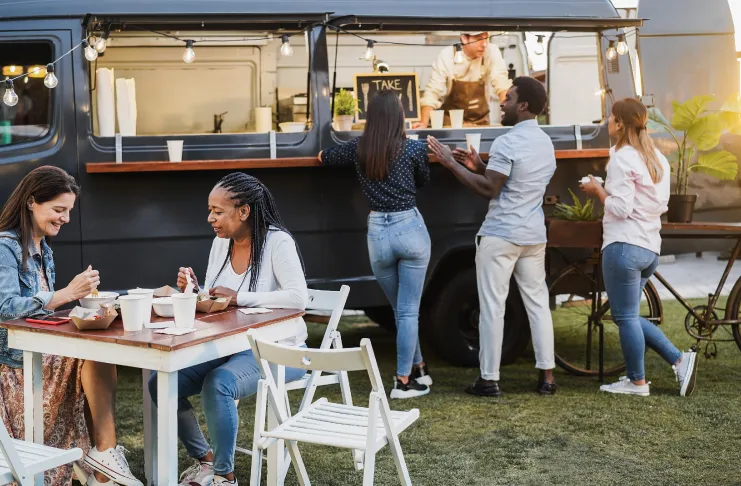Dreaming of running your own food business but don’t want the high costs of a restaurant? A food truck could be your perfect solution! The food truck industry has exploded in popularity, offering entrepreneurs a low-cost entry into the food business with high potential returns.
But how do you start a food truck business that actually succeeds? From permits to marketing, this guide covers everything you need to know. Follow these actionable steps to turn your dream into reality!
1. Why Start a Food Truck Business?
The food truck industry is booming! Here’s why:
- Lower startup costs than a traditional restaurant
- Flexibility to move locations and test different markets
- Growing demand for unique and high-quality street food
- Higher profit margins compared to brick-and-mortar restaurants
Key Stats:
📊 The U.S. food truck market is expected to reach $1.5 billion by 2027 (IBISWorld).
📊 Food trucks generate an average of $250,000–$500,000 annually (Food Truck Empire).
2. Essential Steps to Start a Food Truck
Step 1: Research Your Market
Before investing in a food truck, research:
✔️ Target audience – Who will buy your food?
✔️ Competitors – What’s already being offered?
✔️ Popular locations – Where do food trucks perform best?
🔹 Pro Tip: Visit local food truck festivals to observe customer preferences.
Step 2: Create a Solid Business Plan
A strong food truck business plan is your roadmap to success. Include:
📌 Concept & menu – What will make your truck unique?
📌 Startup costs – Budget for a truck, equipment, permits, and marketing.
📌 Revenue model – Pricing strategy and expected profits.
💡 Example: A well-crafted business plan can increase your chances of securing loans and investors.
Step 3: Secure Permits & Licenses
Food truck regulations vary by city, but common requirements include:
✔️ Business License
✔️ Food Handler’s Permit
✔️ Health Department Approval
✔️ Parking Permits
🚨 Warning: Failing to get proper permits can lead to fines or business closure!
Step 4: Choose & Customize Your Truck
Your food truck is your mobile restaurant—make it stand out!
🔹 Buy or lease a truck
🔹 Install high-quality kitchen equipment
🔹 Wrap it with an eye-catching logo
🎨 Branding Tip: A well-designed truck attracts more customers.
Step 5: Craft an Irresistible Menu
Your menu should be:
✅ Unique – Offer something customers can’t find elsewhere.
✅ Simple – Too many items slow down service.
✅ Cost-effective – Use ingredients that maximize profit margins.
🍔 Example: A gourmet burger truck focusing on premium ingredients can charge higher prices and attract foodies.
Step 6: Find the Best Locations
The right location can make or break your food truck business!
📍 High-foot-traffic areas (office hubs, colleges, parks)
📍 Events & festivals
📍 Breweries or business districts
💡 Insider Tip: Partner with event organizers for exclusive vendor spots!
Step 7: Market Your Food Truck Like a Pro
Without marketing, even the best food trucks fail! Use these strategies:
📢 Social Media Marketing: Post daily updates on Instagram & TikTok.
📢 Local SEO: Optimize Google My Business with your location & menu.
📢 Loyalty Programs: Offer discounts to repeat customers.
📣 Bonus: Use a food truck finder app to help customers locate you.
3. How Much Does It Cost to Start a Food Truck?
💰 Food truck startup costs typically range from $50,000 to $150,000 depending on factors like location, truck customization, and permits.
Breakdown of Costs:
| Expense | Estimated Cost |
|---|---|
| Truck Purchase | $30,000 – $100,000 |
| Kitchen Equipment | $10,000 – $50,000 |
| Permits & Licenses | $2,000 – $10,000 |
| Insurance | $2,000 – $4,000/year |
| Marketing & Branding | $1,000 – $5,000 |
| Initial Inventory | $2,000 – $5,000 |
💡 Tip: Consider buying a used truck to lower costs.
4. Common Challenges & How to Overcome Them
Starting a food truck isn’t just about cooking great food. Here’s how to tackle common roadblocks:
🚧 Challenge: Finding a Profitable Location
✅ Solution: Use social media to announce your location daily.
🚧 Challenge: Complying with Strict Regulations
✅ Solution: Research local laws before starting and consult a food truck attorney.
🚧 Challenge: Managing Food Costs
✅ Solution: Buy ingredients in bulk and reduce waste through portion control.
🚧 Challenge: Seasonal Sales Fluctuations
✅ Solution: Offer catering services or partner with indoor events during winter.
Conclusion
Starting a food truck can be one of the most exciting and rewarding business ventures. With proper planning, marketing, and execution, you can build a successful food truck that attracts loyal customers and generates steady revenue.
💡 Final Thought: The best time to start is NOW! Take action and bring your food truck dream to life.


